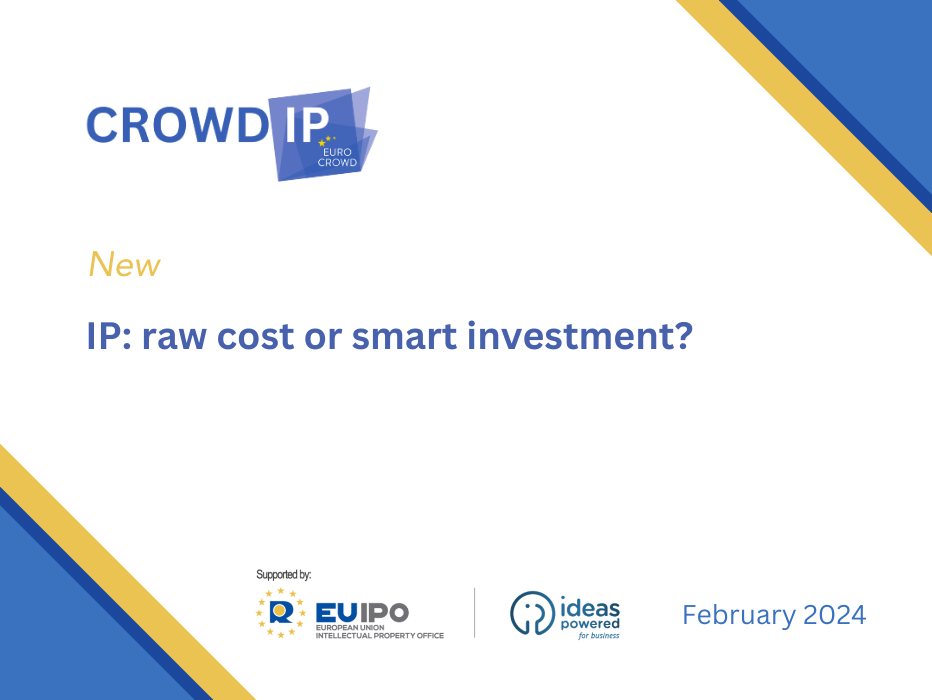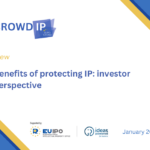CrowdIP
IP: raw cost or smart investment?

For a startup, intellectual property (IP) can be viewed as both a raw cost and a smart investment in the future, depending on how it is managed and leveraged. What it comes down to in every individual case, requires analysis and priority setting. Here's a breakdown of both perspectives:
IP as a Raw Cost:
- Upfront Expenses: Filing for patents, trademarks, or other forms of IP protection incurs upfront costs in terms of legal fees, filing fees, and administrative expenses.
- Operational Expenses: Maintaining and enforcing IP rights may require ongoing operational expenses, such as monitoring for infringements, taking legal action, and renewing registrations.
- Resource Allocation: Allocating resources to establish and maintain IP can divert funds and attention from other critical areas, especially for resource-constrained startups.
IP as a Smart Investment:
- Asset Value: IP, when protected and managed strategically, becomes a valuable intangible asset that can enhance the overall value of the startup. This can positively impact the company's valuation during fundraising or exit events.
- Competitive Advantage: IP protection provides a competitive advantage by safeguarding unique innovations, technologies, or brand elements. This can help the startup differentiate itself in the market and attract customers and investors.
- Revenue Generation: Well-managed IP can be monetized through licensing agreements or partnerships, generating additional revenue streams for the startup. Licensing IP to other companies can be a significant source of income.
- Market Positioning: Having protected IP enhances the startup's credibility and market positioning. Investors may see a commitment to innovation and risk mitigation, making the company more attractive.
- Risk Mitigation: IP protection mitigates the risk of competitors copying or infringing on the startup's innovations. This risk reduction can be crucial for maintaining market share and sustaining growth.
- Negotiation Power:
- Strong IP holdings can enhance the startup's negotiation power in collaborations, partnerships, or acquisition discussions. It provides leverage in negotiations with potential investors or acquirers.
- Long-Term Sustainability
- Investing in IP is an investment in the long-term sustainability of the startup. It creates a protective barrier against competitors and contributes to the company's resilience in the market.
- Balancing Act: Strategic Management: The key is to manage IP strategically within the individual settings and conditions of each business. Startups should carefully assess which aspects of their innovations warrant IP protection and align their strategy with business goals.
- Consideration of ROI: Startups should weigh the potential return on investment (ROI) of IP against the costs incurred. The value derived from IP, such as increased valuation or revenue generation, should justify the initial and ongoing expenses.
In conclusion, while IP represents a cost in terms of initial and ongoing expenses, it can also be a smart investment when managed strategically. Startups that view IP as a long-term asset and integrate it into their overall business strategy are likely to realize significant benefits in the future. Not all IP might need protection at any given time, so strategic planning and smart investment in the right protection at the right time will help to reduce cost and increase value added.
Disclaimer: The content provided by EUROCROWD in this post is intended for general informational purposes only. This information is not intended to constitute legal advice or provide bespoke solutions to specific problems. EUROCROWD endeavours to offer guidance to help individuals and businesses protect their intellectual property (IP). However, readers are expressly advised that the information presented should not be considered a substitute for professional advice or legal counsel. While we strive to ensure the accuracy and timeliness of the information shared, laws and regulations may change, and the content may not reflect the most current legal standards or interpretations. Your first step might be to visit EUIPO - Ideas Powered for Business: The European Union Intellectual Property Office (EUIPO) offers a platform called Ideas Powered for Business. It provides tools and resources for businesses to manage and protect their IP https://business.ideaspowered.eu



